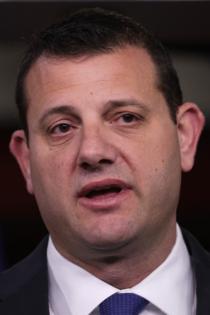Will vote for Trump's 'Big Beautiful Bill' come back to haunt David Valadeo?
Published in Political News
Democrats quickly fired away at Rep. David Valadao’s record once President Donald Trump signed the “Big Beautiful Bill” that cut taxes and Medicaid funding, saying that because of Valadao’s vote, “rural hospitals across America are now at risk of closing.”
It’s impossible to predict the specific impact on hospitals and for that matter people in the Republican’s Central Valley district at this point.
But “what we do know for sure is there will be reductions in the services hospitals can offer,” said Kristof Stremikis, director of market analysis and insight at the nonpartisan, nonprofit California Health Care Foundation.
Stremikis estimated that California is likely to see cuts of at least $15 billion to $20 billion in federal Medicaid aid annually. About two-thirds of the costs for Medi-Cal, the state’s low-income health program, are federally funded. The state picks up most of the rest.
Carmela Coyle, president and chief executive officer of the California Hospital Association, found that “while the final tally of the damage that will be inflicted is still unknown, California hospitals could lose up to 30% of their Medi-Cal revenues over the next decade.”
That estimate, she said, “does not include the increase in uncompensated care losses that hospitals will incur resulting from coverage losses and the cuts the state will inevitably be forced to make due to federal funding reductions.” The association is a nonprofit organization representing more than 400 hospitals and health systems in the state.
New Democratic ad
The Democratic claim is from a new digital ad by the Democratic Congressional Campaign Committee that began running this week on Meta. They’re targeting Valadao, a Hanford Republican, who represents a district that could be hit unusually hard by Medicaid cuts.
The new law will cut federal spending on Medicaid by nearly $1 trillion nationwide over 10 years.
The cuts could have an outsized impact on more sparsely populated areas such as parts of the district Valadao represents. The majority-Latino district includes most of Kings County and pieces of Tulare and Kern counties.
About two-thirds of the district’s population, or 521,192 people, used Medi-Cal in 2023. More than 207,000 hospital visits, or 46% of the total, were covered by Medi-Cal, according to estimates by the California Health Care Foundation.
Total Medi-Cal payments to hospitals in the district in 2023 totaled $820 million, or half of their combined net patient revenue. Kern Medical Hospital, at 72%, was the most reliant on Medi-Cal in the district.
“Medi-Cal is the single largest payer for each hospital, yet some rely on it more heavily than others,” the foundation said in a fact sheet.
The fate of rural hospitals almost derailed the bill in the Senate, but a $50 billion fund was included to help rural health costs. KFF, a nonpartisan health care research organization, estimates that federal Medicaid spending in rural areas will drop by $155 billion over the next 10 years.
“While the additional support is helpful, it’s hard to imagine $50 billion is going to be adequate in the context of $1 trillion in overall cuts,” said Stremikis of the rural fund.
Republicans, Democrats battle
Republicans are fighting back against the Democrats’ claims
“National Democrats’ desperate and fear-mongering attack ads won’t fool anyone,” said Christian Martinez, spokesman for the National Republican Congressional Committee.
Valadao has explained his vote for the bill, which would extend expiring income tax rates beyond this year.
He cited increased funding for specialty crop research, expanding crop insurance coverage, preventing pollution of drinking water in rural communities and extending funding for the Emergency Food Assistance Program.
“No piece of legislation is perfect, but this bill ultimately reflects the priorities of (California’s 22nd Congressional District) — lower taxes, stronger farms, better infrastructure, and a commitment to protecting access to healthcare for Valley residents,” the congressman said.
Whether his Medicaid stand will matter in next year’s election is unclear. Valadao first won his seat in 2012, then lost it in the middle of Trump’s first term in 2018. He won it back two years later and last year won by 7 percentage points.
“I strongly suspect that the Democrats will do everything they can to keep reminding people about his vote for the Big Beautiful Bill, especially because he had said that he would oppose cuts to Medicaid like this,” said Thomas Holyoke, professor of political science at California State University, Fresno..
But remember, he said, “Valadao has an uncanny ability to win re-election regardless of the headwinds against him “
©2025 McClatchy Washington Bureau. Visit at mcclatchydc.com. Distributed by Tribune Content Agency, LLC.

























































Comments